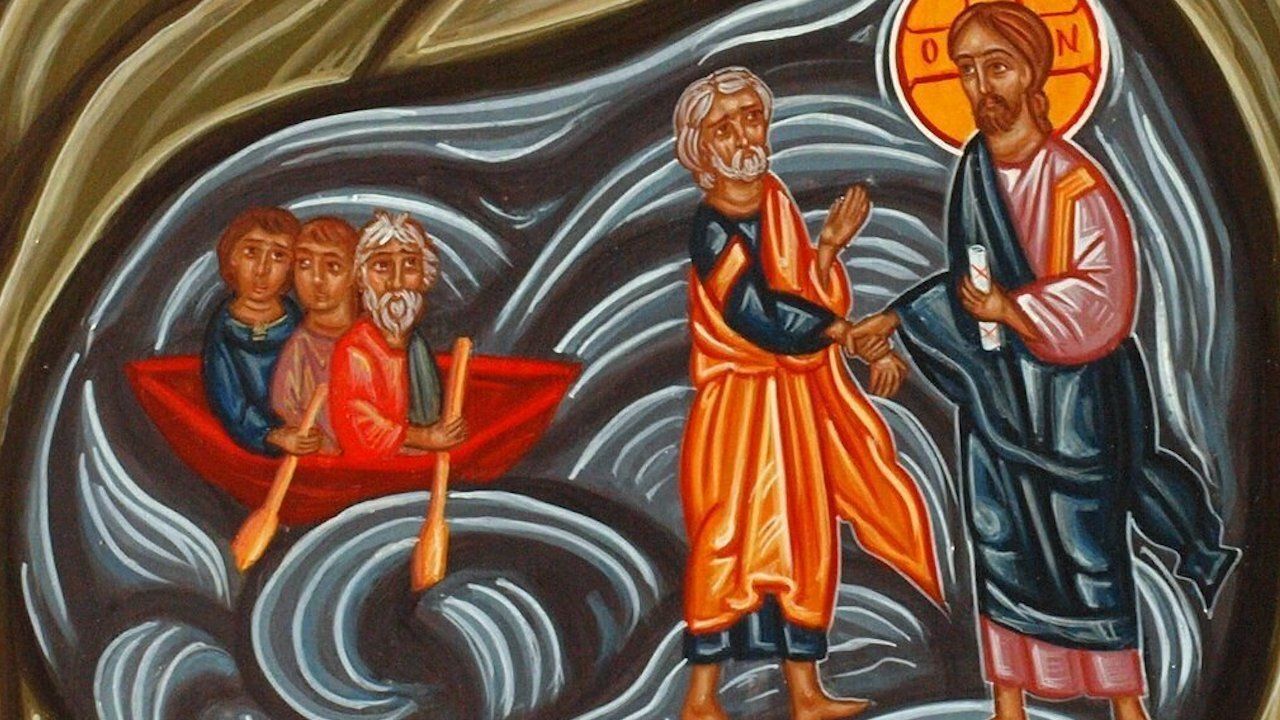Be Not Afraid
by Origen
Feast of St Menas of Egypt
Anno Domini 2022, November 11

And then the disciples “having crossed over came to the land Gennesaret” (Matt. 14:34), of which word, if we knew the interpretation, we might gain some assistance in the exposition of the present passage. And observe, since God is faithful, and will not suffer the multitudes to be tempted above that they are able (cf. 1 Cor. 10:13), in what way the Son of God constrained the disciples to enter into the boat, as being stronger and able to get as far as the middle of the sea, and to endure the trials by the waves, until they became worthy of divine assistance, and saw Jesus and heard Him when He had gone up, and to cross over and come to the land Gennesaret; but as for the multitudes who, because they were weaker, did not make trial of the boat and the waves and the contrary wind, them He sent away, and went up into the mountain apart to pray (Matt. 14:22, 23). To pray for whom? Was it perhaps to pray for the multitudes that, when they were dismissed after the loaves of blessing, they might do nothing opposed to their dismissal by Jesus? And for the disciples that, when they were constrained by Him to enter into the boat and to go before Him unto the other side, they might suffer nothing in the sea nor from the contrary wind? And I would say with confidence, that, because of the prayer of Jesus to the Father for the disciples, they suffered nothing when sea and wave and contrary wind were striving against them. The simpler disciple, then, may be satisfied with the bare narrative; but let us remember, if ever we fall into distressful temptations, that Jesus has constrained us to enter into their boat, wishing us to go before Him unto the other side; for it is not possible for us to reach the other side, unless we have endured the temptations of waves and contrary wind. Then when we see many difficulties besetting us, and with moderate struggle we have swum through them to some extent, let us consider that our boat is in the midst of the sea, distressed at that time by the waves which wish us to make shipwreck concerning faith or some one of the virtues; but when we see the spirit of the evil one striving against us, let us conceive that then the wind is contrary to us. When then in such suffering we have spent three watches of the night—that is, of the darkness which is in the temptations—striving nobly with all our might and watching ourselves so as not to make shipwreck concerning the faith or some one of the virtues,—the first watch against the father of darkness and wickedness, the second watch against his son “who opposeth and exalteth himself against all that is called God or thing that is worshipped” (2 Thess. 2:4) and the third watch against the spirit that is opposed to the Holy Spirit [Origen seems to oppose the Divine Trinity with an evil trinity], then we believe that when the fourth watch impendeth, when “the night is far spent, and the day is at hand” (Rom. 13:12) the Son of God will come to us, that He may prepare the sea for us, walking upon it. And when we see the Word appearing unto us we shall indeed be troubled before we clearly understand that it is the Saviour who has come to us, supposing that we are still beholding an apparition, and for fear shall cry out; but He Himself straightway will speak to us saying, “Be of good cheer; it is I; be not afraid” (Matt. 14:27). And if, warmly moved by His “Be of good cheer,” any Peter be found among us, who is on his way to perfection but has not yet become perfect, having gone down from the boat, as if coming out of that temptation in which he was distressed, he will indeed walk at first, wishing to come to Jesus upon the waters; but being as yet of little faith, and as yet doubting, will see that the wind is strong and will be afraid and begin to sink; but he will not sink because he will call upon Jesus with loud voice, and will say to Him, “Lord, save me” (Matt. 14:30).then immediately while such a Peter is yet speaking and saying, “Lord save me,” the Word will stretch forth His hand, holding out assistance to such an one, and will take hold of him when he is beginning to sink, and will reproach him for his little faith and doubting (Matt. 14:31). Only, observe that He did not say, “O thou without faith,” but, “O thou of little faith,” and that it was said, “Wherefore didst thou doubt,” as he had still a measure of faith, but also had a tendency towards that which was opposed to faith.
Contribute to Cultural Renewal by Sharing on Your Preferred Platform
In an isolating secularized culture where the Church's voice is muffled through her many divisions, Christians need all the help they can get to strengthen their faith in God and love toward their neighbor. Eighth Day Institute offers hope to all Christians through our adherence to the Nicene faith, our ecumenical dialogues of love and truth, and our many events and publications to strengthen faith, grow in wisdom, and foster Christian friendships of love. Will you join us in our efforts to renew soul & city? Donate today and join the community of Eighth Day Members who are working together to renew culture through faith & learning.









